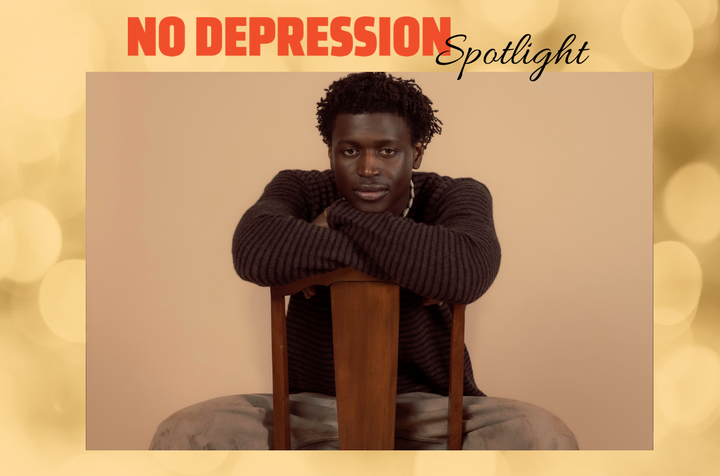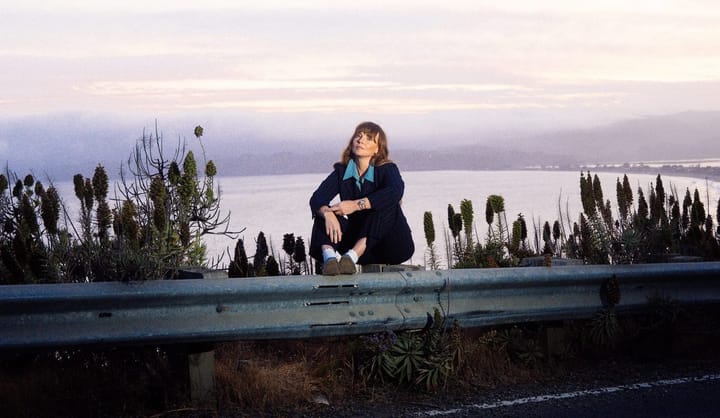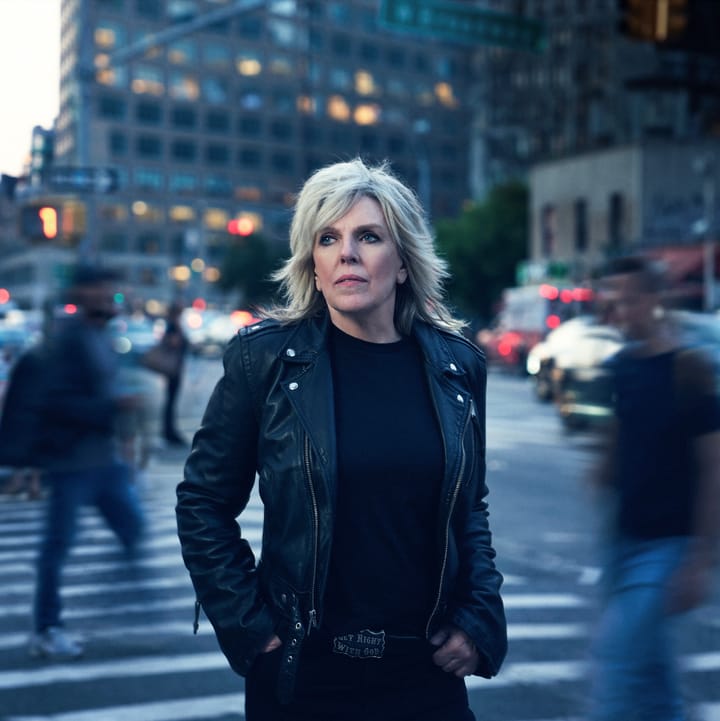"I like country & western, and I like soul, and I love that place where the two of them live, black and white, together. It makes sense to me."
--Nick Lowe
Nick Lowe was a tender lad of 17 when he began his recording career as a member of Kippington Lodge, the band that eventually evolved into pub-rock pioneers Brinsley Schwarz. It's now 41 years later, and given that Lowe's new album is titled At My Age, one can't help but wonder: What would Nick Lowe, youth, make of Nick Lowe, elder statesman?
"Wow, that's quite a thought," Lowe muses. "When I was a teenager, there weren't any sort of middle-aged rock 'n' roll people. I wouldn't have actually believed it was possible."
By the time Lowe accepted he was in the game for the long haul, he had a few notches in his belt. Between 1975 and 1985, a string of stellar singles -- "And So It Goes", "Cruel To Be Kind", "I Knew The Bride When She Used To Rock & Roll" -- had made him a moderate success on both sides of the Atlantic.
It eventually became clear that superstardom wasn't in the cards. What he refers to as "my brief career as a pop star" began to wane, "and I started to think about what to do when it was all finished," Lowe says. He looked around for other models to emulate.
"They were nearly all country and western artists," recalls Lowe, 58. "These sort of people seem to be able to go on, right into old age, and get better and better."
And so, as it turns out, has Nick Lowe. If he'd hopped in a time machine way back when and rocketed into the 21st century, would his adolescent self give the current incarnation a thumbs-up?
"I would have thought I was probably all right," he decides, "and look upon myself fairly benignly, as a pleasant old boy who's been through the mill and knows a couple of things."
At My Age follows, by six years, Lowe's last studio album, The Convincer. It was the longest interval between studio albums in his career; "that sounds shameful," he says. Part of the hold-up was that Lowe isn't nearly as prolific as his extensive back catalogue might suggest.
"I think about writing all the time," he explains. "When I'm doing my shopping or driving the car. But it's nearly all rubbish.
"And then every so often, you'll get an idea and think, 'Oh, now that's quite good, nice and simple. I can deal with that.' If a couple of them come along, accompanied by this feeling that it's time to make a new record, then that's it. And if the first recording session goes right, that will serve as the engine, so to speak, that drives the writing and recording of the rest of the record. That is what has happened in past."
But not this time. Life kept getting in the way of art -- "the same sort of stuff that happens to everybody: births, marriages, and deaths," he says. So the recordings that eventually formed At My Age were eked out over an extended period. "I was recording recreationally, almost as a refuge," Lowe explains.
He would call up his longtime band drummer Bobby Irwin, keyboard player Geraint Watkins, and guitarist Steve Donnelly and if they were available, studio time was booked. "Eventually, the time came for us to have a look at and see what we'd got," he continues. "And we started to say, 'Oh, there's quite a cheerful record lurking in here.'"
At My Age does have a surprisingly good-natured character. There are peppy numbers ("The Club", "People Change") that recall his heyday as Dave Edmunds' foil in Rockpile, while chugging, country-flavored numbers such as "Long Limbed Girl" and his rendition of the Charlie Feathers/Quinton Claunch number "A Man In Love" point back to his fondness for the Everly Brothers and his former father-in-law, Johnny Cash.
Lyrically, there is still plenty of Lowe's trademark bite, particularly on "I Trained Her To Love Me". Sung from the point of view of a despicable roue, the song is practically an inverted '60s girl-group gem, with masculine sadism replacing teenage masochism. But where the Shangri-Las or Shirelles could put their point across by singing with unchecked abandon, Lowe struggled to craft just the right vibe.
"You've got to get it to sound just mean-and-sleazy enough -- and rather feeble -- to get the point across," he explains. "We tried it a few times, to get the balance right, get it just unpleasant enough."
Although this seedy gem is not strictly autobiographical, the author concedes it is rooted in real experience. "I have a certain sympathy with that character. I hate to admit it, but I do...and I know a few other people who do, too."
Despite its overall tone of reflection, At My Age is not torn from the pages of Lowe's diary. Far from it. "My songs are not autobiographical," he says. "I do know what I'm talking about, what it feels like to feel rotten or happy. But, in the main, it is all made up."
During his lengthy run of weddings and funerals, acquaintances and relations less familiar with his muse kept wondering why he didn't reach for his guitar more often. "Friends sort of look at you reproachfully, and say, 'C'mon, there's a good song in this. You should be writing this down!'" he admits. "Oh my God! Can you imagine? The most awful experiences..."
"Although there is no doubt about it, if you are going through a period where you are feeling particularly blue, then it will be represented in the songs you write. But I love writing blue songs. They cheer me right up. And the older you get, the more fun it is to really ladle it on."
Even more so than The Convincer, Lowe's latest reiterates his fondness for vintage soul music. The track list includes his version of "The Other Side Of The Coin", which he originally wrote for Solomon Burke's Grammy-winning 2002 comeback album Don't Give Up On Me. Watkins' organ on "Hope For Us All", the mellow mariachi horns that grace "A Better Man," and the shuffle-and-swing of "Not Too Long Ago" (originally by Louisiana swamp pop act the Uniques) all reverberate with echoes of soul pioneers who've colored outside the lines: Dan Penn, Spooner Oldham, Tony Joe White.
This twist in the maturing Nick Lowe sound was something even his teenage self might have presaged. After all, as a youngster, R&B was very much his bag. "Like lots of other kids over here, I was a mod," he says. "And we all liked this new music -- well, it seemed new to us -- this fantastic stuff beamed in from some planet. It was our own little language. If you saw someone walking down the road with a Joe Tex album under their arm, you would go up to them and start talking. You had spotted a friend."
Integrating those driving rhythms and grooves into his own sound proved trickier. While the influence is audible in his '80s work (particularly on 1984's oft-overlooked Nick Lowe And His Cowboy Outfit), the elements feel a bit forced. "I went for the sort of obvious things," he says. "I tried to pitch my songs high up, and affect this kind of black sound in my voice. And it just sounded terrible."
Eventually he made the country-soul connection, via artists such as Arthur Alexander and Joe South. "Then I thought, 'Well, I can do that.' Because I like country & western, and I like soul, and I love that place where the two of them live, black and white, together. It makes sense to me. And you don't have to make a fool of yourself there."
The street runs both ways, too. Recently, both Howard Tate and the Holmes Brothers included Lowe compositions on their new albums.
At My Age also reiterates Lowe's subtle strengths as a producer. Although this album, like everything he's done since The Impossible Bird in 1994, was produced in conjunction with Neil Brockbank, it retains the simplicity that became his trademark producing such notables as the Damned, Elvis Costello and the Pretenders. (Chrissie Hynde remains part of Lowe's camp, dropping by this time to sing on "People Change".)
Lowe's rather stripped-down sound came partially from his own aesthetic, but also from the well-timed lesson of a cutting engineer he met via Dave Edmunds. "This guy had a reputation for being quite blunt with his clients," recalls Lowe, who tagged along with Edmunds one day when the guitarist dropped off some tapes, only to be rebuked by the opinionated engineer.
In pursuit of his own variation on the Wall of Sound, Edmunds had over-egged the pudding, and was told so in rather terse language. "Edmunds hit the roof, grabbed his tapes, and off he went," remembers Lowe, who remained behind and dared to ask why the engineer was displeased.
"Back then," he recalls, "everybody always used to say, 'Make my record loud.' That was the thing, to make it sound loud on the radio. Everybody thought there was some sort of secret process you went through." The disgruntled yet savvy engineer told Lowe otherwise: "It all comes down to the arranging, and using as little as possible."
The engineer pulled out a then-unreleased cut by the Four Seasons (either "December 1963" or "Who Loves You", Lowe can't recall which), and cranked it up. "And he said, 'Listen to this, it is perfectly arranged: There are hardly any instruments on it, fabulous singing, a great song, the key is just right...' He pointed out all these things out to me. I got a fabulous lesson from this rather grumpy little man, and it stood me real good stead.
"Shortly after that, I started getting production jobs myself, and putting what I'd learned to use, especially on [Costello's] My Aim Is True. Some of those cuts are really stripped-down, but you get a drama going, and it draws you in." It was the same purity of sound that had thrilled Lowe on sides by Johnny Cash and Otis Redding, and now he knew how to conjure it himself.
Working as a producer also prepared Lowe for the inevitable downside of a recording career, i.e. what comes after the hits dry up. "It was almost like I had one foot in the enemy's camp as well," Lowe says. "I could hobnob with management and record companies, people like that, and I knew how they talked about artists, which is largely with a great deal of disdain. So I knew what the score was, and that, like most people who aren't Elton John or Cher -- these strange people who seem to manage to have a pop career that spans decades -- it would soon all be over."
Yet if he was going to continue to earn a wage without resorting to pulling pints or laying bricks, Lowe knew he had to rack up certain accomplishments as a performer. And he did. There were a few chart successes, and the requisite appearances of "Top Of The Pops" and "American Bandstand". When it wound down, he was ready -- if not exactly excited -- to go forge a new path.
"When my time was up in that respect, I was quite relieved," he reflects. "I wasn't a drug addict, but I certainly was an alcoholic, and I was absolutely exhausted and wrung out. I was relieved to see the ass end of it, really."
By then, he'd amassed a fairly loyal clutch of fans who loved him for what he did. They love him for being Nick Lowe -- even when he doesn't, when he'd rather be somebody else.
"Friends tend to tell me to relax: 'This is what you do. You're not Howlin' Wolf, and you never will be. What you do is what you do, and that's what people like you for.' I sometimes need reminding about that," he figures. "I'm not fantastic, but I think I do a pretty good job."
ND contributing editor Kurt B. Reighley is going to hold his breath until Nick Lowe And His Cowboy Outfit is reissued on CD or he turns blue and passes out, whichever comes first. He has long harbored a suspicion that Lowe was the inspiration for Prince's "Darling Nikki" on Purple Rain.




Comments ()